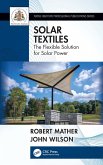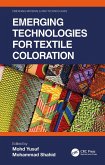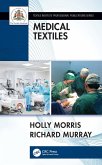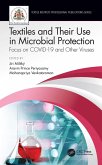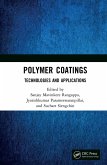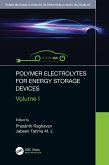85,95 €
85,95 €
inkl. MwSt.
Sofort per Download lieferbar

43 °P sammeln
85,95 €
Als Download kaufen

85,95 €
inkl. MwSt.
Sofort per Download lieferbar

43 °P sammeln
Jetzt verschenken
Alle Infos zum eBook verschenken
85,95 €
inkl. MwSt.
Sofort per Download lieferbar
Alle Infos zum eBook verschenken

43 °P sammeln
- Format: ePub
- Merkliste
- Auf die Merkliste
- Bewerten Bewerten
- Teilen
- Produkt teilen
- Produkterinnerung
- Produkterinnerung

Bitte loggen Sie sich zunächst in Ihr Kundenkonto ein oder registrieren Sie sich bei
bücher.de, um das eBook-Abo tolino select nutzen zu können.
Hier können Sie sich einloggen
Hier können Sie sich einloggen
Sie sind bereits eingeloggt. Klicken Sie auf 2. tolino select Abo, um fortzufahren.

Bitte loggen Sie sich zunächst in Ihr Kundenkonto ein oder registrieren Sie sich bei bücher.de, um das eBook-Abo tolino select nutzen zu können.
This book is about the incorporation and operation of solar cells on textile fabrics and reflects the progressively increasing commercial interest in PV cell technology and the versatility that their integration in textiles provide.
- Geräte: eReader
- mit Kopierschutz
- eBook Hilfe
Andere Kunden interessierten sich auch für
![Solar Textiles (eBook, PDF) Solar Textiles (eBook, PDF)]() Robert MatherSolar Textiles (eBook, PDF)85,95 €
Robert MatherSolar Textiles (eBook, PDF)85,95 €![Emerging Technologies for Textile Coloration (eBook, ePUB) Emerging Technologies for Textile Coloration (eBook, ePUB)]() Emerging Technologies for Textile Coloration (eBook, ePUB)49,95 €
Emerging Technologies for Textile Coloration (eBook, ePUB)49,95 €![Medical Textiles (eBook, ePUB) Medical Textiles (eBook, ePUB)]() Holly MorrisMedical Textiles (eBook, ePUB)166,95 €
Holly MorrisMedical Textiles (eBook, ePUB)166,95 €![Conducting Polymers for Advanced Energy Applications (eBook, ePUB) Conducting Polymers for Advanced Energy Applications (eBook, ePUB)]() Conducting Polymers for Advanced Energy Applications (eBook, ePUB)48,95 €
Conducting Polymers for Advanced Energy Applications (eBook, ePUB)48,95 €![Textiles and Their Use in Microbial Protection (eBook, ePUB) Textiles and Their Use in Microbial Protection (eBook, ePUB)]() Textiles and Their Use in Microbial Protection (eBook, ePUB)94,95 €
Textiles and Their Use in Microbial Protection (eBook, ePUB)94,95 €![Polymer Coatings: Technologies and Applications (eBook, ePUB) Polymer Coatings: Technologies and Applications (eBook, ePUB)]() Polymer Coatings: Technologies and Applications (eBook, ePUB)68,95 €
Polymer Coatings: Technologies and Applications (eBook, ePUB)68,95 €![Polymer Electrolytes for Energy Storage Devices (eBook, ePUB) Polymer Electrolytes for Energy Storage Devices (eBook, ePUB)]() Polymer Electrolytes for Energy Storage Devices (eBook, ePUB)50,95 €
Polymer Electrolytes for Energy Storage Devices (eBook, ePUB)50,95 €-
-
-
This book is about the incorporation and operation of solar cells on textile fabrics and reflects the progressively increasing commercial interest in PV cell technology and the versatility that their integration in textiles provide.
Dieser Download kann aus rechtlichen Gründen nur mit Rechnungsadresse in A, B, BG, CY, CZ, D, DK, EW, E, FIN, F, GR, HR, H, IRL, I, LT, L, LR, M, NL, PL, P, R, S, SLO, SK ausgeliefert werden.
Produktdetails
- Produktdetails
- Verlag: Taylor & Francis eBooks
- Seitenzahl: 123
- Erscheinungstermin: 21. November 2022
- Englisch
- ISBN-13: 9781000782899
- Artikelnr.: 65826930
- Verlag: Taylor & Francis eBooks
- Seitenzahl: 123
- Erscheinungstermin: 21. November 2022
- Englisch
- ISBN-13: 9781000782899
- Artikelnr.: 65826930
- Herstellerkennzeichnung Die Herstellerinformationen sind derzeit nicht verfügbar.
Robert Mather's involvement with textiles began when he joined the staff at the Scottish College of Textiles (SCOT) in Galashiels in 1983. He had previously worked for ten years at Ciba-Geigy Pigments in Paisley, following two spells of postdoctoral work at Imperial College and Brunel University in London. At SCOT, which subsequently became part of Heriot-Watt University, Robert acquired his interest in technical textiles and established a profile in the processing of polypropylene fibres. He also worked on three-dimensional woven engineering products.
His current R&D interests include the incorporation of solar cells on textiles, and Power Textiles Limited was formed in 2012 with John Wilson as co-Director to promote solar textiles. Robert also has an interest in gas plasma treatments for textiles. He was Director for five years of the newly established Technical Textiles and Polymer Innovation Unit at Galashiels, set up with funds from the UK Department of Trade and Industry. During this period, the Unit successfully undertook projects for a variety of companies, and Robert was contracted to write on the technical textile industry in Scotland for a briefing paper for the Scottish Executive. The Unit was eventually subsumed into the UK TechniTex Faraday Partnership, and he became responsible for technology transfer in the Partnership's organisation. He has also been Director of the Biomedical Textiles Research Centre at Heriot-Watt University.
He is the author of over 90 technical papers and in recent years has contributed chapters to a number of books on technical textiles. Together with a co-author, he wrote a book on textile chemistry for the Royal Society of Chemistry in 2011. A second, updated edition was published in 2015, and a third edition is currently in preparation.
Professional memberships held include:
John Wilson was Professor of Materials Processing at Heriot-Watt University, Physics, from 1996 until 2012. His first post there was Wolfson Research Fellow 1975, following a similar appointment at St Andrews University. At Heriot-Watt University, John was Academic Head of Physics (2002-5 and 2010-2012), setting up several degree programmes, and supervising over 30 PhD and MSc students, including a collaboration with Chinese Ph.D. students from Beijing Jiaotong University. His publications include a book on solar energy, encyclopaedia and book chapters, and over 200 scientific papers.
His interests in the applications of solar energy span over 40 years of research, from thin-film II-VI cells for his PhD thesis, later pioneering the UK amorphous silicon solar cell research, and to current work on flexible solar cells. Through Rotary, he worked with a small group at The Turing Trust to design and deliver a solar-powered, off-grid, computer laboratory for Malawi. He has been a consultant to the UN and to UK companies and institutions throughout the world (e.g. Romania, India, Nigeria) on solar energy and photovoltaics, and was founder secretary of the Scottish Solar Energy Group until 1988. He presently delivers solar photovoltaic training courses for the Renewable Energy Institute Ltd, Edinburgh.
His materials R&D used lasers and plasmas to deposit or modify metals, semiconductors, dielectrics and polymers, for applications in optics, mechanics and bioengineering. In particular, research into thin-film diamond led to the founding of DILAB Limited in 1994, of which he was managing director. Power Textiles Limited was founded in 2012 with co-Director Robert Mather to promote flexible solar cells on textiles.
Professional memberships held include:
His current R&D interests include the incorporation of solar cells on textiles, and Power Textiles Limited was formed in 2012 with John Wilson as co-Director to promote solar textiles. Robert also has an interest in gas plasma treatments for textiles. He was Director for five years of the newly established Technical Textiles and Polymer Innovation Unit at Galashiels, set up with funds from the UK Department of Trade and Industry. During this period, the Unit successfully undertook projects for a variety of companies, and Robert was contracted to write on the technical textile industry in Scotland for a briefing paper for the Scottish Executive. The Unit was eventually subsumed into the UK TechniTex Faraday Partnership, and he became responsible for technology transfer in the Partnership's organisation. He has also been Director of the Biomedical Textiles Research Centre at Heriot-Watt University.
He is the author of over 90 technical papers and in recent years has contributed chapters to a number of books on technical textiles. Together with a co-author, he wrote a book on textile chemistry for the Royal Society of Chemistry in 2011. A second, updated edition was published in 2015, and a third edition is currently in preparation.
Professional memberships held include:
- Fellow of the Royal Society of Chemistry, CChem
- Fellow of the Textile Institute, CTex
John Wilson was Professor of Materials Processing at Heriot-Watt University, Physics, from 1996 until 2012. His first post there was Wolfson Research Fellow 1975, following a similar appointment at St Andrews University. At Heriot-Watt University, John was Academic Head of Physics (2002-5 and 2010-2012), setting up several degree programmes, and supervising over 30 PhD and MSc students, including a collaboration with Chinese Ph.D. students from Beijing Jiaotong University. His publications include a book on solar energy, encyclopaedia and book chapters, and over 200 scientific papers.
His interests in the applications of solar energy span over 40 years of research, from thin-film II-VI cells for his PhD thesis, later pioneering the UK amorphous silicon solar cell research, and to current work on flexible solar cells. Through Rotary, he worked with a small group at The Turing Trust to design and deliver a solar-powered, off-grid, computer laboratory for Malawi. He has been a consultant to the UN and to UK companies and institutions throughout the world (e.g. Romania, India, Nigeria) on solar energy and photovoltaics, and was founder secretary of the Scottish Solar Energy Group until 1988. He presently delivers solar photovoltaic training courses for the Renewable Energy Institute Ltd, Edinburgh.
His materials R&D used lasers and plasmas to deposit or modify metals, semiconductors, dielectrics and polymers, for applications in optics, mechanics and bioengineering. In particular, research into thin-film diamond led to the founding of DILAB Limited in 1994, of which he was managing director. Power Textiles Limited was founded in 2012 with co-Director Robert Mather to promote flexible solar cells on textiles.
Professional memberships held include:
- Fellow of the Institute of Physics (and a past member of their Science Board), CPhys and CEng
1. The Versatility of Textile Fabrics
2. The Photovoltaic Effect and How It Is Used
3. Constructions of Textile Fabrics
4. Strategies for Achieving Electrically Conducting Textile Fabrics
5. Enabling Textile Fabrics to Become Photovoltaically Active
6. Technological and Design Specifications
7. Manufacturing: Moving from Laboratory to Production
8. Applications of Solar Textile Fabrics
9. The Outlook for Solar Textiles
2. The Photovoltaic Effect and How It Is Used
3. Constructions of Textile Fabrics
4. Strategies for Achieving Electrically Conducting Textile Fabrics
5. Enabling Textile Fabrics to Become Photovoltaically Active
6. Technological and Design Specifications
7. Manufacturing: Moving from Laboratory to Production
8. Applications of Solar Textile Fabrics
9. The Outlook for Solar Textiles
1. The Versatility of Textile Fabrics
2. The Photovoltaic Effect and How It Is Used
3. Constructions of Textile Fabrics
4. Strategies for Achieving Electrically Conducting Textile Fabrics
5. Enabling Textile Fabrics to Become Photovoltaically Active
6. Technological and Design Specifications
7. Manufacturing: Moving from Laboratory to Production
8. Applications of Solar Textile Fabrics
9. The Outlook for Solar Textiles
2. The Photovoltaic Effect and How It Is Used
3. Constructions of Textile Fabrics
4. Strategies for Achieving Electrically Conducting Textile Fabrics
5. Enabling Textile Fabrics to Become Photovoltaically Active
6. Technological and Design Specifications
7. Manufacturing: Moving from Laboratory to Production
8. Applications of Solar Textile Fabrics
9. The Outlook for Solar Textiles

